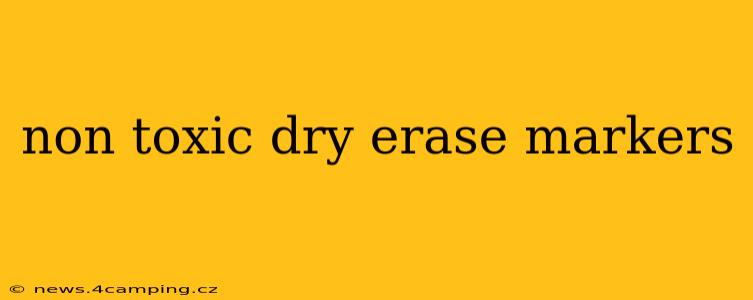Dry erase markers are a staple in classrooms, offices, and homes. But with the increasing awareness of the potential health risks associated with certain chemicals, the demand for non-toxic options has soared. This guide will delve into the world of non-toxic dry erase markers, exploring their composition, benefits, drawbacks, and how to choose the best ones for your needs.
What Makes a Dry Erase Marker "Non-Toxic"?
The term "non-toxic" can be somewhat ambiguous. While there's no universally accepted definition, non-toxic dry erase markers generally avoid harmful volatile organic compounds (VOCs), xylene, toluene, and other potentially hazardous ingredients commonly found in traditional markers. Instead, they often utilize water-based inks and less harmful solvents. However, always check the manufacturer's safety data sheet (SDS) for a complete list of ingredients and potential hazards. Remember, "non-toxic" doesn't necessarily mean completely harmless; it implies a lower risk compared to conventional options.
Benefits of Using Non-Toxic Dry Erase Markers
The primary benefit is, of course, reduced exposure to potentially harmful chemicals. This is particularly crucial in environments with children or individuals sensitive to VOCs. Other advantages include:
- Reduced odor: Non-toxic markers often have a much milder or nonexistent odor, creating a more pleasant writing experience.
- Better air quality: Lower VOC emissions contribute to improved indoor air quality, benefiting both health and the environment.
- Improved safety: The reduced risk of exposure to toxic chemicals enhances overall safety, especially in schools and daycare centers.
Drawbacks of Non-Toxic Dry Erase Markers
While non-toxic markers offer significant advantages, there are some potential drawbacks to consider:
- Price: Non-toxic markers are generally more expensive than their conventional counterparts.
- Availability: Finding non-toxic options might require more searching, as they aren't always as readily available in stores.
- Performance: Some users report that non-toxic markers might not erase as cleanly or write as smoothly as traditional markers, although this varies significantly among brands.
Are Non-Toxic Dry Erase Markers Safe for Children?
This is a frequently asked question. While the term "non-toxic" doesn't guarantee absolute safety, non-toxic markers are generally considered safer for children than conventional markers due to the reduced presence of harmful chemicals. However, always supervise young children when using markers and ensure proper ventilation. Choose markers with certifications like AP (Art & Creative Materials Institute) non-toxic seals for added assurance.
How to Choose the Best Non-Toxic Dry Erase Markers
When selecting non-toxic dry erase markers, consider the following factors:
- Ingredients: Check the label carefully for a list of ingredients and look for markers that explicitly state they are free from VOCs, xylene, and toluene.
- Certifications: Look for certifications from reputable organizations such as the AP (Art & Creative Materials Institute).
- Reviews: Read online reviews to get a sense of the marker's performance and erasing capabilities.
- Intended use: Choose markers that are specifically designed for the surface you'll be using them on (e.g., whiteboards, glass).
What are the best non-toxic dry erase markers?
This is subjective and depends on individual needs and preferences. However, researching reviews from reliable sources and paying attention to ingredient lists will help you find a brand that meets your criteria for quality and safety. Look for markers that boast smooth writing, vibrant colors, and easy clean-up.
How do I clean up non-toxic dry erase markers?
Cleaning up most non-toxic dry erase markers is generally the same as with traditional markers: a damp cloth or eraser should suffice. Always follow the manufacturer's instructions for best results. Persistent marks may require a slightly stronger cleaning solution, but avoid harsh chemicals.
By carefully considering the information outlined in this guide, you can make informed decisions and choose non-toxic dry erase markers that are both safe and effective for your needs. Remember to prioritize safety and always refer to the manufacturer's guidelines.
